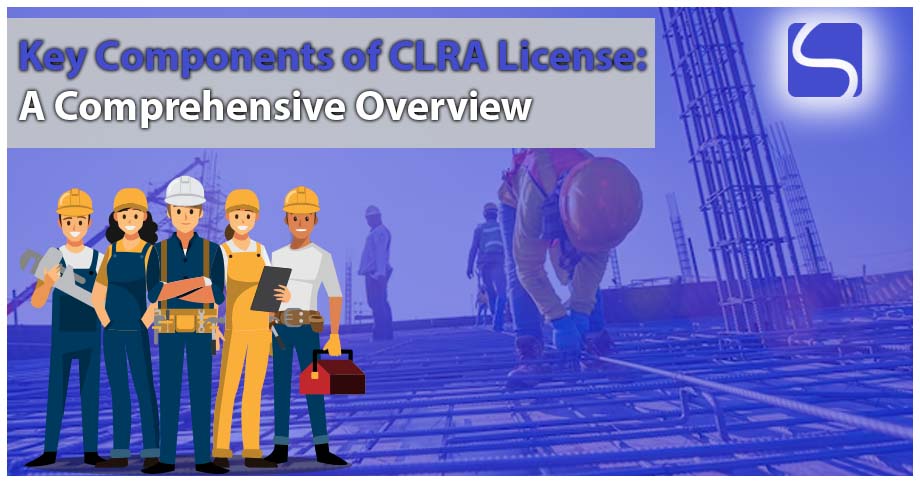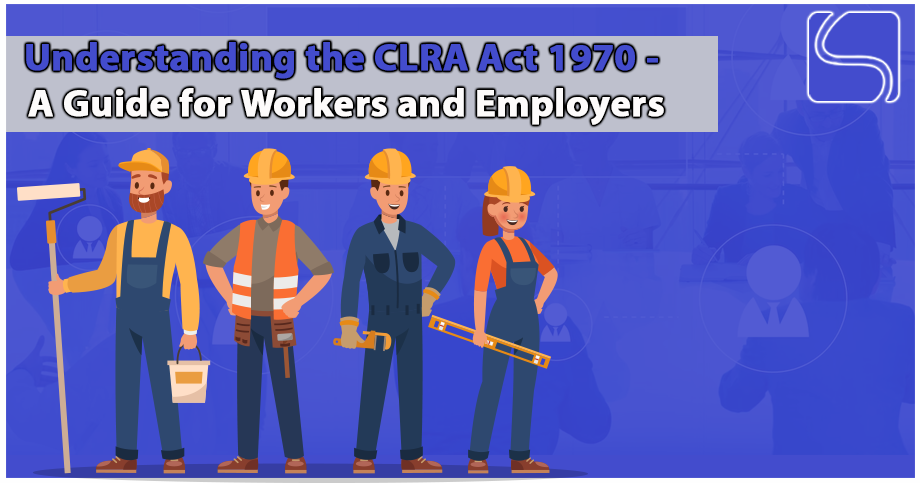Key Components of CLRA License: A Comprehensive Overview

Shivam Narwal | Updated: Mar 10, 2023 | Category: CLRA License
The Contract Labour (Regulation and Abolition) Act, 1970[1] is a social welfare legislation enacted by the Government of India to regulate the working conditions and rights of contract laborers. The Act aims to prevent the exploitation of contract laborers and ensure that they are provided with basic amenities, such as medical facilities, housing, and adequate wages. One of the significant provisions of the CLRA Act is the requirement for employers to obtain a CLRA license before engaging contract laborers. In this blog post, we will explore the details of the CLRA license, its significance, and the process of obtaining one.
Table of Contents
What is a CLRA License?
A CLRA license is a legal document that permits an employer to engage contract laborers for a specified period. The license is issued by the appropriate government authority, depending on the state or union territory where the employer operates. The license is valid for a year and must be renewed annually.
It contains specific information about the employer, such as its name, address, nature of business, and the number of contract laborers it intends to engage. The license also specifies the period for which the employer is authorized to engage contract laborers.
Who Needs to Obtain a CLRA License?
Under the CLRA Act, any establishment that engages more than 20 contract laborers on any given day during the preceding 12 months must obtain a CLRA license. The Act defines an establishment as any place where any industry, trade, business, manufacture, or occupation is carried out. The establishment can be a factory, mine, plantation, port, railway company, or any other place where contract labour is engaged.
Why is a CLRA License Important?
Obtaining a Contract Labour (Regulation and Abolition) license is crucial for employers who engage contract laborers because it ensures compliance with the provisions of the CLRA Act. Failure to obtain a CLRA license can result in legal action, fines, and penalties. Some of the reasons why a CLRA license is essential are:
- Legal Compliance: The CLRA Act is a statutory requirement that mandates employers to obtain a Contract Labour (Regulation and Abolition) license before engaging contract laborers. Failure to comply with this requirement can result in legal action and fines.
- Prevention of Exploitation: The CLRA Act aims to prevent the exploitation of contract laborers by ensuring that they are provided with basic amenities, such as medical facilities, housing, and adequate wages. Obtaining a CLRA license is a step towards ensuring that contract laborers are not exploited.
- Protection of Rights: The CLRA Act provides for the protection of the rights of contract laborers. Employers who obtain a CLRA license are obligated to comply with the provisions of the Act, including the payment of wages, provision of basic amenities, and working conditions.
How to Obtain a CLRA License?
The process of obtaining a CLRA license involves the following steps:
Step 1: Application
The employer must submit an application for a Contract Labour (Regulation and Abolition) license to the appropriate government authority. The application must contain the following information:
- Name and address of the employer.
- Nature of the business.
- Number of contract laborers to be engaged.
- Period for which the license is required.
Step 2: Verification
After receiving the application, the government authority will verify the details provided by the employer. The authority may conduct an inspection of the establishment to verify the number of contract laborers engaged and the working conditions provided.
Step 3: Fee Payment
The employer must pay the prescribed fee for obtaining the CLRA license.
Step 4: Issuance of License
After verifying the details and receiving the fee payment, the government authority will issue the Contract Labour (Regulation and Abolition) license to the employer. The license will contain specific information about the employer and the contract laborers, such as the period for which the license is valid, the number of contract laborers authorized, and the working conditions provided.
Step 5: Renewal
The Contract Labour (Regulation and Abolition) license is valid for a year and must be renewed annually. The employer must apply for the renewal of the license before the expiry date. The renewal process is similar to the initial application process, and the employer must submit the required information and pay the prescribed fee.
Penalties for Non-Compliance
Failure to obtain a CLRA license or comply with the provisions of the Contract Labour (Regulation and Abolition) Act can result in legal action, fines, and penalties. Some of the penalties for non-compliance are:
- Fine: The employer may be fined for failing to obtain a Contract Labour (Regulation and Abolition) license or violating the provisions of the Act. The fine amount can vary depending on the severity of the violation.
- Imprisonment: In some cases, the employer may be imprisoned for violating the provisions of the Act.
- Cancellation of License: The government authority may cancel the CLRA license of the employer for non-compliance with the Act.
- Blacklisting: The employer may be blacklisted by the government authority, which can affect its reputation and ability to conduct business.
Benefits of CLRA License
Obtaining a CLRA license offers several benefits to both employers and contract laborers. Some of the benefits are:
- Legal Compliance: The CLRA Act mandates that employers obtain a license before engaging contract laborers. By obtaining a Contract Labour (Regulation and Abolition) license, employers ensure compliance with the provisions of the Act and avoid any legal issues.
- Protection of Rights: The CLRA Act provides several provisions for the protection of contract laborers’ rights, such as minimum wages, working hours, and working conditions. By obtaining a Contract Labour (Regulation and Abolition) license, employers ensure that they comply with these provisions and protect the rights of contract laborers.
- Better Management: The CLRA Act mandates that employers maintain registers for contract laborers’ attendance, wages, and other details. By obtaining a CLRA license, employers can manage contract laborers’ records better and ensure that they are paid and treated fairly.
- Reduced Liabilities: Employers who engage contract laborers without obtaining a Contract Labour (Regulation and Abolition) license or complying with the provisions of the Act may face legal action, fines, and penalties. By obtaining a CLRA license and complying with the Act, employers can reduce their liabilities and avoid legal issues.
Conclusion
The Contract Labour (Regulation and Abolition) Act, 1970, and the requirement for employers to obtain a CLRA license play a significant role in ensuring the protection of contract laborers’ rights and preventing their exploitation. The Act provides for the payment of minimum wages, working conditions, and basic amenities, such as medical facilities and housing. By obtaining a Contract Labour (Regulation and Abolition) license, employers not only ensure legal compliance but also protect the rights of contract laborers and contribute to better management practices.
Moreover, obtaining a Contract Labour (Regulation and Abolition) license offers several benefits, including legal compliance, protection of rights, better management, and improved reputation. It is, therefore, crucial for employers to understand the significance of the CLRA license and the process of obtaining one. Non-compliance can result in legal action, fines, and penalties, which can adversely affect the employer’s reputation and ability to conduct business.
In conclusion, the CLRA license is not just a legal requirement but a step towards ensuring social welfare and responsible business practices. Employers who obtain a Contract Labour (Regulation and Abolition) license demonstrate their commitment to protecting the rights of contract laborers and contributing to the growth and development of the economy.
Read our Article:Meaning of Building and Other Construction Workers: An Overview












